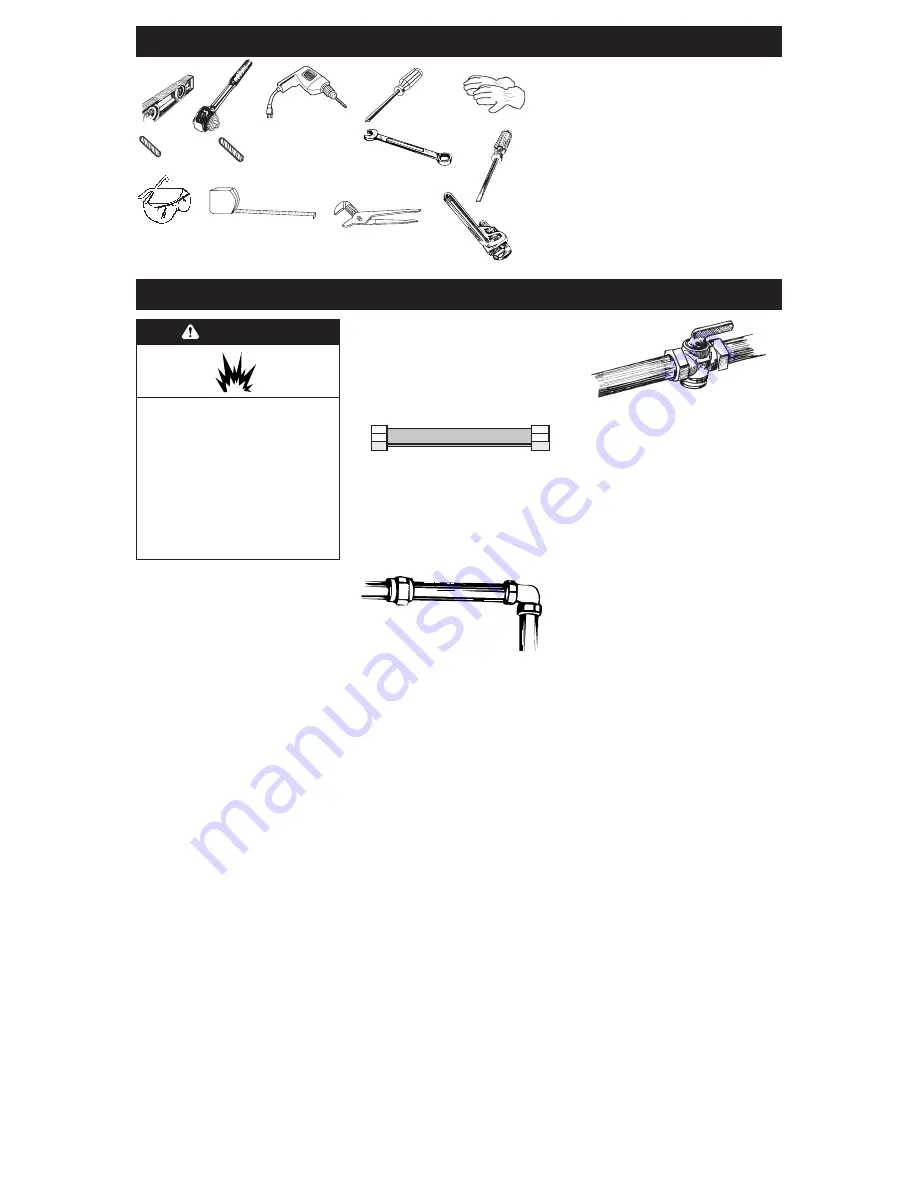
Page 3
Gas supply requirements
Observe all governing codes and ordinances.
This installation must conform with all local
codes and ordinances.
In the absence of local
codes, installation must conform with American
National Standard, National Fuel Gas Code ANSI
Z223.1 — latest edition
*
.
Input ratings
shown on the model/serial rating
plate are for elevations up to 2,000 feet. For
assistance when installing the range at higher
elevations, contact your local service company.
Type of gas:
This range is design-certified by
CSA International for use with Natural gas or,
after proper conversion, for use with L. P. gas.
This range is factory set for use with Natural gas.
Gas conversion instructions are provided on
pages 7-8. The model/serial rating plate located
on the frame behind the broiler drawer has
information on the type of gas that can be used.
If the type of gas listed does not agree with the
type of gas available, check with the local gas
supplier.
Conversion must be done by a
qualified service technician.
Gas supply line:
Provide a gas supply line of 3/4"
rigid pipe to the range location. With L.P. gas,
piping or tubing size can be 1/2" minimum. A
smaller size pipe on longer runs may result in
insufficient gas supply. Usually, L.P. gas
suppliers determine the size and materials used
in the system.
Pipe-joint compounds
made for use with L.P. gas
must be used on pipe threads only.
Flexible metal appliance connector:
If local codes
permit, a new AGA or CSA design-certified, 1/2"
or 3/4" I.D., flexible metal appliance connector is
recommended for connecting range to the gas
supply line. A 1/2" male pipe thread nipple is
needed for connection to pressure regulator
connection fitting.
Do Not kink or damage the
flexible metal tubing when moving the range.
Shutoff valve:
The supply line must be equipped
with a manual shutoff valve. This valve should
be located in the same room as the range and
should be in a location that allows ease of
opening and closing. The valve is for turning on
or shutting off gas to the range.
Do Not block
access to shutoff valve.
Pressure regulator:
The gas pressure regulator
supplied with this range must be used. The inlet
pressure to the regulator should be as follows
for proper operation:
NATURAL GAS:
Minimum pressure: 5 inches WCP
Maximum pressure: 14 inches WCP
L.P. GAS:
Minimum pressure: 11 inches WCP
Maximum pressure: 14 inches WCP
Contact local gas supplier if you are not sure
about the inlet pressure.
Line pressure testing above 1/2 psi gauge
(14" WCP) —
The range and its individual
manual shutoff valve must be disconnected
from the gas supply piping system during any
pressure testing of that system at test pressures
greater than 1/2 psig (3.5 kPa).
Line pressure testing at 1/2 psi gauge
(14" WCP) or lower —
The range must be
isolated from the gas supply piping system by
closing its individual manual shutoff valve
during any pressure testing of that system at test
pressures equal to or less than 1/2 psig (3.5 kPa).
Copies of the standards listed may be obtained from:
* CSA International
8501 East Pleasant Valley Road
Cleveland, Ohio 44131-5575
Rigid pipe connection:
Requires a
combination of pipe fittings to obtain
an in-line connection to the range. All
strains must be removed from the
supply and fuel lines so range will be
level and in line.
Materials required:
• gas line shutoff valve
• 1/2" male pipe thread nipple for connection to pressure
regulator
• L.P. gas-resistant pipe-joint compound
• AGA or CSA design-certified flexible metal appliance
connector (4-5 feet) or rigid gas supply line as needed
• Insulated pad or 1/4" plywood if range is installed
over carpeting
Tools needed:
level
tape measure
or ruler
hand or
electric drill
wood floor:
1/8" drill bit
concrete/ceramic floors:
3/16" carbide-tipped masonry
drill bit (Hammer may be
needed for anchors.)
1/2" and 3/8"
combination
wrench
Phillips
screwdriver
pipe
wrench
flat-blade
screwdriver
gloves
channel lock
pliers
safety glasses
3/8" drive
ratchet
Explosion Hazard
Use a new AGA or CSA approved gas
supply line.
Install a shut-off valve.
Securely tighten all gas connections.
If connected to LP, have a qualified person
make sure gas pressure does not exceed
14" water column. Examples of a qualified
person include licensed heating personnel,
authorized gas company personnel, and
authorized service personnel.
Failure to do so can result in death,
explosion, or fire.
WARNING



























